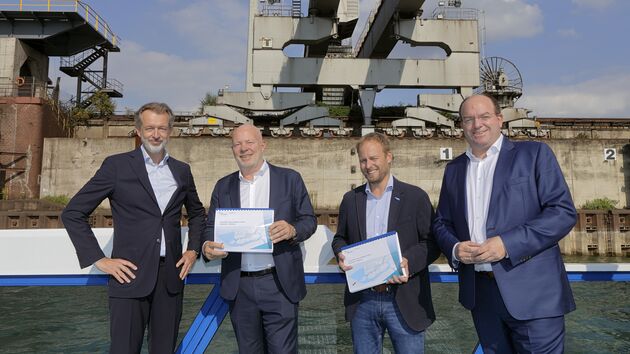
image: Van links naar rechts: Boudewijn Siemons, Robert Simons, Martin Murrack, Markus Bangen. Foto: Krischerfotografie
In a joint feasibility study, Duisport inland port and Rotterdam seaport announce a significant stride forward in their collaboration, solidifying their leadership in the development of European hydrogen networks.
The study’s focus: Preparing a crucial hydrogen corridor to meet the anticipated surge in demand for green hydrogen until 2045. This study underscores the pivotal role these ports will play as future hubs in the hydrogen market.
Additionally, it highlights the imperative need for infrastructure and transportation route scaling. In partnership with OCI Global, a demonstration is planned to illustrate the practicality of the envisioned hydrogen corridor.
This research delineates the shared responsibility of these two ports in supporting the industry’s burgeoning appetite for hydrogen and its derivatives. They are set to act as intermediaries between governments, industry, and future players in the hydrogen market.
OCI Global, a Dutch, publicly listed global leader in nitrogen, methanol, and hydrogen, collaborates with the ports to demonstrate that the planned hydrogen corridor between Rotterdam and Duisport effectively already exists. It is poised to meet the high demand for low-carbon and renewable hydrogen from the industrial cluster in the Ruhr region.
For some time now, OCI Global and the Rotterdam port have been working together on various decarbonization initiatives. OCI Global manages the sole ammonia import terminal in the Rotterdam port, which is currently undergoing expansion to triple its transshipment capacity, in anticipation of the escalating demand for ammonia as a cleaner fuel in sectors facing energy transition challenges.
Furthermore, OCI, which operates a methanol import terminal, recently announced two new partnerships in the Rotterdam port related to green methanol. One with Unibarge, for the development of the world’s first dual-fueled bunkerships powered by OCI HyFuels green methanol, and another with X-Press Feeder Lines for the supply of green methanol for their upcoming methanol dual-fueled common feeder ships. Both projects are set to be implemented next year.

Image: Van links naar rechts: Wouter Demenint, Jellema Koen, Alexander Garbar, Martin Murrack, Markus Bangen, Robert
Simons, Boudewijn Siemons, Werner Schaurte-Küppers, Annemarie Houtman, Ocke Hamann. Foto: Krischerfotografie
Fueling Market Activation and Accelerating Energy Transition
The feasibility study reveals an expected substantial surge in demand for low-carbon hydrogen, exceeding 3 million tons annually in North Rhine-Westphalia until 2045. Methanol demand is also projected to see a significant increase, surpassing 2.5 million tons per year. However, further clarity on supply and demand is required. Duisport and Havenbedrijf Rotterdam are mediating between politics and business to align these factors, expediting investment and subsidy decision-making.
The ‘Hy.Region.Rijn.Ruhrgebied e.V.’ initiative, co-founded by Duisport, has gained support from the Rotterdam port, further bolstering this collaborative effort.
Infrastructure Enhancement Imperative
To meet the anticipated demand, expanding relevant infrastructure and designating suitable areas are crucial. According to the study, the first hydrogen pipeline between the two ports should be operational by 2027, catering to the medium-term surge in green hydrogen demand in North Rhine-Westphalia. This should be followed by the installation of pipelines for hydrogen derivatives and CO2 export. Additionally, inland waterway and rail transport will remain essential in kickstarting the hydrogen chains and facilitating initial imports. Ultimately, the study suggests that multiple hydrogen pipelines will be necessary to meet the demand in North Rhine-Westphalia and beyond.
Rotterdam’s Vice Mayor H.E.Robert Simons: “The relationship between the largest inland port duisport and the largest seaport Rotterdam demonstrates the importance of cooperation in the energy transition for industry in Northwest Europe.”
Martin Murrack, Duisburg’s city director and the department head responsible for the port: “With its participation in this further hydrogen project, the port of Duisburg is once again impressively demonstrating its innovative strength and charisma. Nowhere is the structural change from a heavy industry dominated by coal and steel to a green technology more noticeable and urgent than here in the Ruhr region. That is why it is particularly important for Duisburg that appropriate impulses from this key technology emanate from here to support the path to decarbonisation of the economy and industry.”
Boudewijn Siemons, interim CEO and COO of Port of Rotterdam Authority: “This study confirms the important role that both ports play as hubs, matchmakers and drivers of the energy transition. It shows which forward-focussing activities are needed in both ports to build the hydrogen economy of the future.”
“We want to bring suppliers, users and political players together at one table to develop concrete solutions for a sustainable path of hydrogen production and use. That is how we make an impactful contribution to activating the market and accelerating the energy transition,” says duisport CEO Markus Bangen.
CEO of OCI Global Ahmed El-Hoshy: “As a Dutch listed company with partners and customers across Europe, we are pleased to be partnering with duisport and our longstanding partner the port of Rotterdam to further develop Europe’s hydrogen value chain. Collaboration between ports and industry, as well as with regulators and other key stakeholders, is crucial in kickstarting the hydrogen economy and delivering the energy transition.”
Source: Port of Rotterdam

